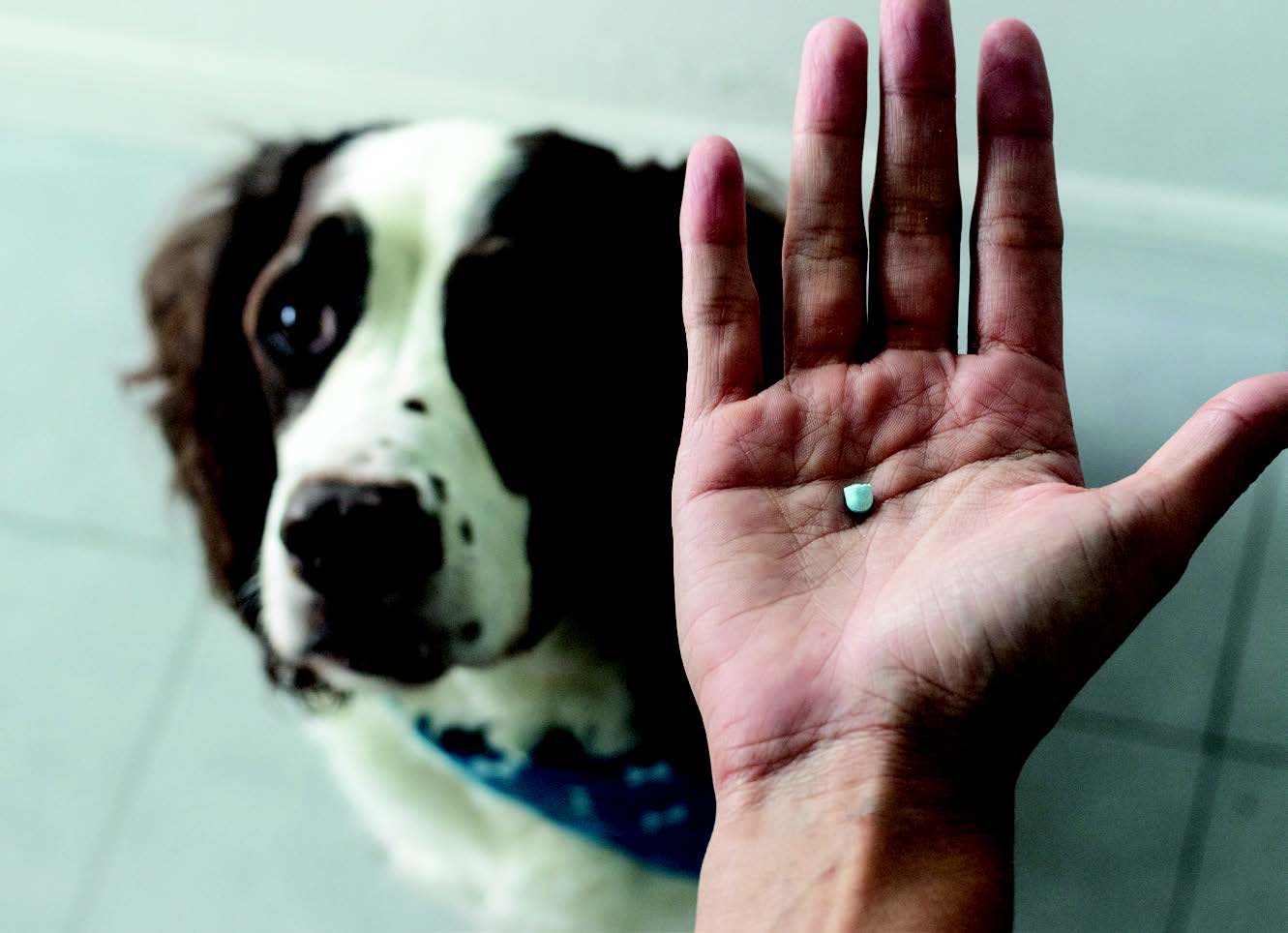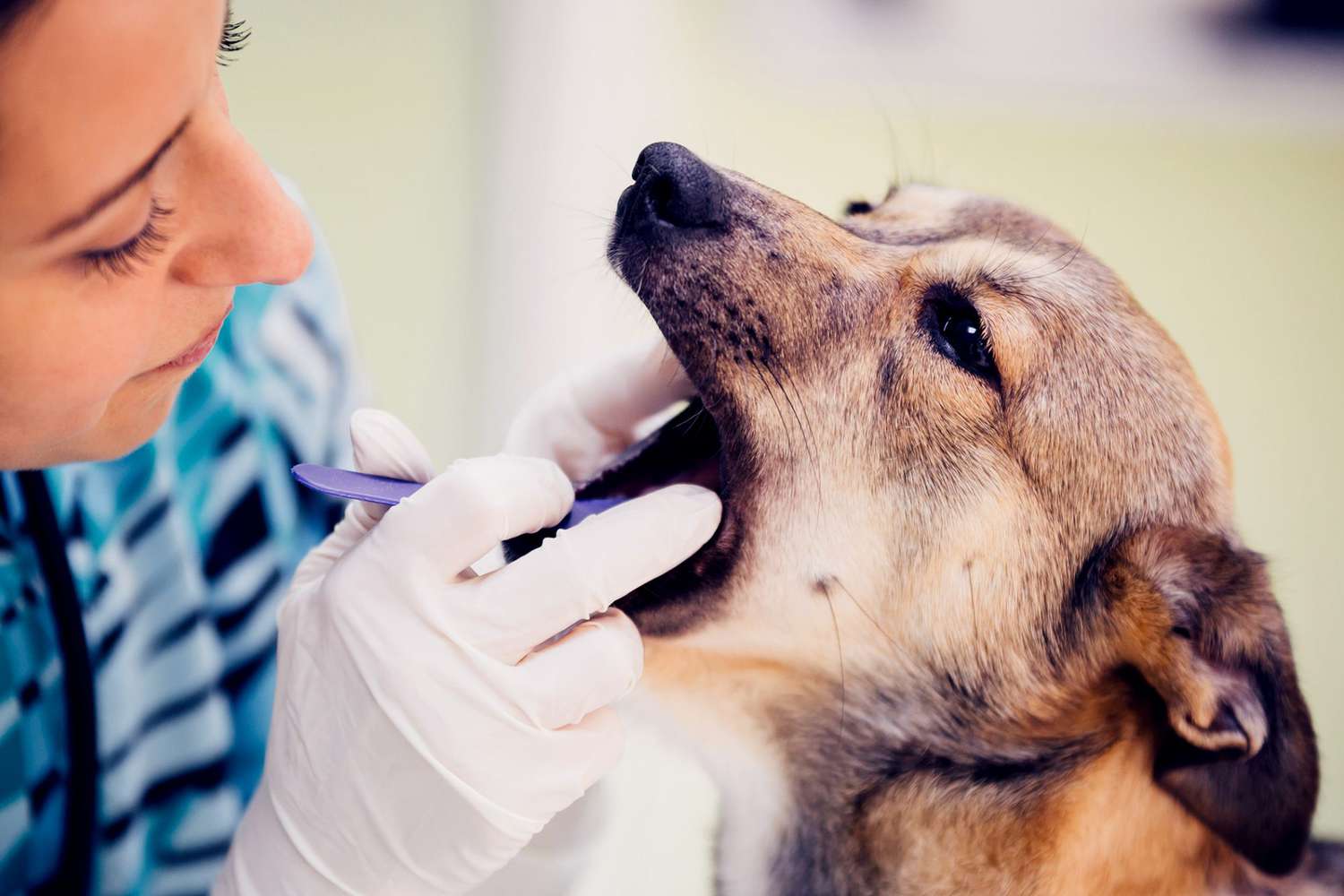Home>Health & Wellness>Common Health Issues>Heart Health>What Do You Have To Do For A Dog Who Is Heartworm Positive?


Heart Health
What Do You Have To Do For A Dog Who Is Heartworm Positive?
Published: February 7, 2024
Learn about the necessary steps and treatments for a heartworm-positive dog to ensure their heart health and overall well-being. Understand the importance of timely intervention and proper care.
(Many of the links in this article redirect to a specific reviewed product. Your purchase of these products through affiliate links helps to generate commission for Pawsomeoldies.com, at no extra cost. Learn more)
Table of Contents
Introduction
Heartworm disease is a serious and potentially fatal condition that can affect our beloved canine companions. As responsible pet owners, it's crucial to understand the implications of heartworm infection and the necessary steps to ensure the well-being of our furry friends. This comprehensive guide aims to shed light on the management of heartworm-positive dogs, providing valuable insights into treatment options, medications, preventative measures, and the essential aspects of monitoring and follow-up care.
Heartworm disease is caused by the parasitic worm Dirofilaria immitis, which is transmitted through the bite of an infected mosquito. Once inside a dog's body, these worms can grow and multiply, eventually affecting the heart, lungs, and blood vessels. The presence of heartworms can lead to severe health complications, including respiratory distress, heart failure, and organ damage. Therefore, early detection and proactive intervention are crucial in mitigating the impact of this insidious disease.
In the following sections, we will delve into the multifaceted approach to managing heartworm-positive dogs, encompassing the latest treatment modalities, medications, and preventative measures. By gaining a deeper understanding of these critical aspects, pet owners and caregivers can make informed decisions to safeguard their canine companions against the detrimental effects of heartworm disease.
Understanding the complexities of heartworm disease and its implications for our furry friends is the first step toward proactive management. With the right knowledge and proactive measures, we can navigate the challenges posed by heartworm infection and provide our canine companions with the best possible care and support. Let's embark on this enlightening journey to empower ourselves with the insights and strategies needed to address heartworm disease in dogs effectively.
Understanding Heartworm Disease
Heartworm disease is a potentially life-threatening condition that affects dogs and, to a lesser extent, cats. It is caused by the parasitic worm Dirofilaria immitis, which is transmitted through the bite of infected mosquitoes. Once a mosquito carrying heartworm larvae bites a dog, the larvae enter the dog's bloodstream and begin their journey to the heart and lungs, where they mature into adult worms.
The presence of these adult worms can lead to a range of health issues, including damage to the heart, lungs, and blood vessels. As the worms multiply and grow, they can obstruct blood flow, leading to respiratory distress, heart failure, and other severe complications. It's important to note that the severity of heartworm disease can vary depending on factors such as the number of worms present, the duration of the infection, and the dog's overall health.
Symptoms of heartworm disease may not be immediately apparent, especially in the early stages. However, as the disease progresses, affected dogs may exhibit symptoms such as coughing, lethargy, exercise intolerance, and weight loss. In advanced cases, dogs may experience difficulty breathing, fainting, and a swollen abdomen due to fluid accumulation.
Preventing heartworm disease is crucial, as treatment can be complex and costly. Regular administration of preventive medications, such as monthly oral or topical treatments, is the cornerstone of heartworm disease prevention. Additionally, minimizing exposure to mosquitoes by using insect repellents and eliminating standing water around the home can further reduce the risk of infection.
Understanding the life cycle of heartworms and the potential consequences of infection underscores the importance of proactive prevention and early detection. Regular veterinary check-ups, including heartworm testing, can aid in the timely identification of the disease, enabling prompt intervention to mitigate its impact.
By gaining a comprehensive understanding of heartworm disease, pet owners can take proactive measures to protect their canine companions from this insidious threat. Through education, vigilance, and a commitment to preventive care, we can work towards ensuring the well-being and longevity of our beloved pets.
Treatment Options for Heartworm Positive Dogs
Upon diagnosis of heartworm disease in dogs, the treatment approach aims to eliminate the adult worms while managing associated complications. It's important to note that treating heartworm-positive dogs requires a comprehensive and tailored strategy, often involving multiple stages to ensure the safety and well-being of the affected animals.
Stabilization and Preliminary Assessment
Before initiating treatment for heartworm-positive dogs, veterinarians often focus on stabilizing the patient's condition and conducting a thorough assessment to gauge the extent of the infection. This may involve diagnostic tests, including blood work, radiographs, and ultrasound, to evaluate the severity of the disease and identify any concurrent health issues.
Immiticide Treatment
The primary medication used to eliminate adult heartworms is melarsomine dihydrochloride, commonly known by the brand name Immiticide. This arsenic-based drug is administered through a series of deep intramuscular injections to target and kill the adult worms residing in the heart and adjacent blood vessels. The treatment protocol typically involves multiple injections over a specified period, with careful monitoring to manage potential side effects and ensure the dog's safety.
Exercise Restriction
During the treatment and recovery phase, strict exercise restriction is crucial to minimize the risk of complications associated with the breakdown of the worms and the subsequent inflammatory response. Dogs undergoing heartworm treatment are often advised to adhere to restricted activity levels, which may include leash walks for bathroom breaks and limited physical exertion to prevent excessive strain on the cardiovascular system.
Supportive Care
In addition to the targeted medication for eliminating adult heartworms, supportive care plays a vital role in managing the overall well-being of heartworm-positive dogs. This may involve medications to alleviate symptoms, such as cough suppressants and anti-inflammatory drugs, as well as nutritional support to bolster the dog's immune system and aid in the recovery process.
Post-Treatment Monitoring
Following the completion of the Immiticide treatment, close monitoring is essential to assess the dog's response and detect any potential complications. This may entail regular veterinary check-ups, including heartworm antigen testing and diagnostic imaging, to evaluate the effectiveness of the treatment and ensure the absence of residual worms or associated health issues.
Ongoing Preventative Measures
Once a dog has completed treatment for heartworm disease, it is imperative to implement stringent preventative measures to safeguard against future infections. This includes adhering to a regular schedule of heartworm preventatives, minimizing exposure to mosquitoes, and maintaining routine veterinary care to monitor the dog's heartworm status and overall health.
In summary, the treatment of heartworm-positive dogs necessitates a multifaceted approach, encompassing targeted medication, supportive care, and diligent monitoring to ensure the best possible outcome for the affected animals. By adhering to a comprehensive treatment plan and prioritizing preventive measures, pet owners and caregivers can play a pivotal role in mitigating the impact of heartworm disease and promoting the long-term well-being of their canine companions.
Read more: How Do You Test For Heartworm In A Dog
Medications and Preventative Measures
Medications and preventative measures are pivotal components in the comprehensive management of heartworm disease in dogs. These strategies not only address existing infections but also serve as crucial safeguards against future infestations. Understanding the role of specific medications and preventive measures is essential for pet owners and caregivers in ensuring the well-being of their canine companions.
Heartworm Preventatives
Regular administration of heartworm preventatives is fundamental in mitigating the risk of heartworm infection in dogs. These preventive medications, available in various formulations such as monthly oral tablets, topical solutions, and injectable products, work to disrupt the development of heartworm larvae transmitted by mosquitoes. By administering these preventatives consistently, pet owners can effectively shield their dogs from the potentially devastating consequences of heartworm disease.
Treatment Compliance
For dogs undergoing treatment for heartworm disease, strict adherence to the prescribed medication regimen is imperative. Whether it involves the administration of Immiticide to eliminate adult heartworms or supportive medications to manage symptoms, compliance with the treatment protocol is vital for achieving successful outcomes. Pet owners are encouraged to follow veterinary recommendations diligently and ensure that their dogs receive the prescribed medications as directed.
Mosquito Control
Minimizing exposure to mosquitoes is a key aspect of heartworm prevention. Implementing measures to control mosquito populations in and around the home environment can significantly reduce the likelihood of mosquito bites and subsequent heartworm transmission. This may involve using mosquito repellents, eliminating standing water where mosquitoes breed, and employing environmental control methods to create a less hospitable habitat for these disease-carrying insects.
Annual Heartworm Testing
Regular heartworm testing, typically conducted during annual wellness exams, enables early detection of heartworm infection and facilitates timely intervention. By routinely screening dogs for heartworm antigen, veterinarians can identify infections in their early stages, allowing for prompt initiation of treatment and preventing the progression of the disease. Annual testing also serves as a proactive measure to confirm the effectiveness of preventative medications and assess the dog's heartworm status.
Veterinary Guidance
Seeking professional veterinary guidance is paramount in navigating the complexities of heartworm medications and preventive measures. Veterinarians play a crucial role in prescribing appropriate heartworm preventatives, tailoring treatment plans for infected dogs, and providing valuable insights into mosquito control strategies. By fostering a collaborative relationship with veterinary professionals, pet owners can access expert guidance and personalized recommendations to safeguard their dogs against heartworm disease.
Incorporating these medications and preventative measures into a comprehensive heartworm management plan empowers pet owners to proactively protect their canine companions from the perils of heartworm disease. By prioritizing preventive care, treatment compliance, and regular veterinary oversight, pet owners can contribute to the well-being and longevity of their beloved dogs, fostering a life free from the threat of heartworm infection.
Monitoring and Follow-Up Care
After initiating treatment for heartworm-positive dogs, diligent monitoring and follow-up care are essential components of the comprehensive management plan. This phase encompasses ongoing assessment, veterinary oversight, and proactive measures to ensure the dog's recovery and long-term well-being.
Post-Treatment Evaluation
Following the completion of heartworm treatment, veterinarians emphasize the importance of post-treatment evaluation to gauge the dog's response and detect any potential complications. This may involve a series of follow-up appointments, during which the dog undergoes thorough physical examinations, diagnostic testing, and imaging studies to assess the effectiveness of the treatment and monitor the dog's overall health status.
Heartworm Antigen Testing
Regular heartworm antigen testing is a critical aspect of post-treatment monitoring. This diagnostic test helps veterinarians determine the presence of heartworm antigens in the dog's bloodstream, providing valuable insights into the success of the treatment and the absence of residual worms. By conducting periodic antigen testing, veterinarians can confirm the dog's heartworm-free status and identify any potential re-infection at an early stage.
Diagnostic Imaging
Diagnostic imaging, such as radiographs and ultrasound, may be employed to visualize the dog's heart and lungs, allowing veterinarians to assess the structural integrity of these vital organs and detect any lingering abnormalities. These imaging studies provide a comprehensive view of the dog's cardiovascular system, aiding in the evaluation of treatment outcomes and the identification of potential complications.
Symptom Monitoring
Close observation of the dog's symptoms and overall well-being is integral to post-treatment care. Pet owners are encouraged to monitor their dogs for any signs of respiratory distress, exercise intolerance, coughing, or other symptoms associated with heartworm disease. By promptly reporting any concerning changes to the veterinarian, pet owners play a crucial role in facilitating early intervention and ensuring the dog's continued recovery.
Preventative Measures
Maintaining a proactive approach to heartworm prevention is paramount in the post-treatment phase. Pet owners should adhere to a regular schedule of heartworm preventatives, as prescribed by the veterinarian, to safeguard their dogs against future infections. Additionally, minimizing exposure to mosquitoes and creating a mosquito-free environment further reduces the risk of re-infection, contributing to the dog's long-term well-being.
Collaborative Care
Effective post-treatment monitoring and follow-up care require a collaborative effort between pet owners and veterinary professionals. By maintaining open communication with the veterinarian and adhering to recommended follow-up appointments, pet owners can ensure that their dogs receive comprehensive care and ongoing support in their recovery journey.
In summary, monitoring and follow-up care constitute a vital phase in the management of heartworm-positive dogs, encompassing vigilant evaluation, diagnostic testing, and preventive measures to safeguard against re-infection. By prioritizing post-treatment monitoring and maintaining a proactive stance toward heartworm prevention, pet owners can contribute to the sustained health and vitality of their canine companions, fostering a future free from the threat of heartworm disease.
Conclusion
In conclusion, the management of heartworm disease in dogs demands a multifaceted approach that encompasses understanding, treatment, preventative measures, and vigilant monitoring. This comprehensive guide has shed light on the complexities of heartworm disease and the essential strategies for addressing this pervasive health concern in our canine companions.
By delving into the intricacies of heartworm disease, pet owners and caregivers gain valuable insights into the potential consequences of infection and the critical role of preventive care. Understanding the life cycle of heartworms and the modes of transmission empowers individuals to proactively safeguard their dogs against this insidious threat.
The treatment of heartworm-positive dogs requires a tailored and comprehensive approach, involving stabilization, targeted medication, supportive care, and diligent monitoring. Through adherence to treatment protocols and post-treatment evaluation, pet owners play a pivotal role in facilitating the recovery and long-term well-being of their dogs.
Medications and preventative measures serve as crucial safeguards against heartworm infection, emphasizing the importance of regular administration of preventatives, treatment compliance, mosquito control, and annual heartworm testing. By integrating these measures into a proactive management plan, pet owners can mitigate the risk of heartworm disease and foster a future free from the perils of this debilitating condition.
The phase of monitoring and follow-up care represents a critical juncture in the management of heartworm-positive dogs, encompassing ongoing assessment, diagnostic testing, and collaborative care. By maintaining a vigilant stance toward post-treatment monitoring and adhering to preventative measures, pet owners contribute to the sustained health and vitality of their canine companions.
In essence, the management of heartworm disease in dogs demands a proactive and informed approach, underpinned by education, collaboration with veterinary professionals, and a steadfast commitment to preventive care. By embracing these principles, pet owners and caregivers can navigate the challenges posed by heartworm disease and provide their dogs with the best possible care and support, ensuring a future free from the threat of heartworm infection.










